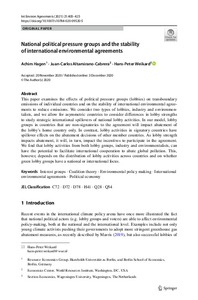National political pressure groups and the stability of international environmental agreements

Hagen, Achim ; Altamirano-Cabrera, Juan-Carlos ; Weikard, Hans-Peter
International Environmental Agreements: Politics, Law and Economics
2021
21
3
405-425
environmental policy ; international agreement ; interest group
International relations
https://doi.org/10.1007/s10784-020-09520-5
English
Bibliogr.
"This paper examines the effects of political pressure groups (lobbies) on transboundary emissions of individual countries and on the stability of international environmental agreements to reduce emissions. We consider two types of lobbies, industry and environmentalists, and we allow for asymmetric countries to consider differences in lobby strengths to study strategic international spillovers of national lobby activities. In our model, lobby groups in countries that are non-signatories to the agreement will impact abatement of the lobby's home country only. In contrast, lobby activities in signatory countries have spillover effects on the abatement decisions of other member countries. As lobby strength impacts abatement, it will, in turn, impact the incentives to participate in the agreement. We find that lobby activities from both lobby groups, industry and environmentalists, can have the potential to facilitate international cooperation to abate global pollution. This, however, depends on the distribution of lobby activities across countries and on whether green lobby groups have a national or international focus."
Digital
The ETUI is co-funded by the European Union. Views and opinions expressed are however those of the author(s) only and do not necessarily reflect those of the European Union or the ETUI.